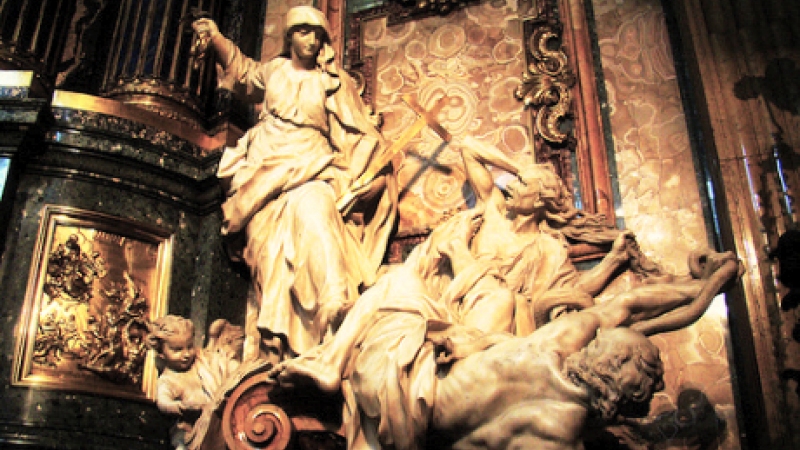

Modernism's impact on religion was quite profound during the late 19th and early 20th centuries. The movement, characterized by its emphasis on individualism, rationalism, and progress, posed a significant challenge to traditional religious beliefs and practices.
Modernism had a profound impact on religion during the late 19th and early 20th centuries. This movement, characterized by its emphasis on individualism, rationalism, and progress, challenged traditional religious beliefs and practices in a variety of ways. Here, I will provide a detailed answer with examples and references to support this argument.
One of the key aspects of modernism that posed a challenge to traditional religious beliefs was its emphasis on individualism. Modernism promoted the idea that individuals should rely on their own reason and personal experiences to understand the world, rather than relying on religious authorities or dogma. This shift towards individualism undermined the authority of religious institutions and their claims to possess absolute truth.
For example, Friedrich Nietzsche, a prominent modernist philosopher, famously proclaimed the "death of God" in his work "Thus Spoke Zarathustra." Nietzsche argued that traditional religious beliefs were no longer credible in the face of scientific and philosophical advancements. His critique of religious morality and the idea of an all-knowing deity challenged the foundations of traditional religious thought.
Furthermore, modernism's emphasis on rationalism and scientific progress also undermined traditional religious beliefs. As scientific discoveries and technological advancements accelerated during this period, many people began to question the supernatural explanations offered by religious institutions. The theory of evolution, for instance, challenged the biblical account of creation and raised doubts about the authority of religious texts.
The works of Charles Darwin, particularly his book "On the Origin of Species," had a significant impact on religious thought. Darwin's theory of evolution by natural selection suggested that life on Earth could be explained through natural processes, rather than divine intervention. This challenged the traditional religious belief in a creator God and raised questions about the accuracy of religious texts.
In addition to individualism and rationalism, modernism also promoted a sense of progress and a belief in human potential. This focus on progress led many to question the relevance and authority of religious institutions that seemed to resist change and cling to traditional beliefs. The emerging fields of psychology and sociology also offered alternative explanations for human behavior and social phenomena, further challenging religious explanations.
Sigmund Freud, for example, argued that religious beliefs were a form of wish fulfillment and a projection of human desires and fears. His psychoanalytic theories suggested that religious experiences could be explained as manifestations of unconscious desires rather than encounters with the divine. This psychological perspective undermined the credibility of religious experiences and contributed to the growing skepticism towards traditional religious beliefs.
In conclusion, modernism had a profound impact on religion during the late 19th and early 20th centuries. Its emphasis on individualism, rationalism, and progress challenged traditional religious beliefs and practices. Prominent modernist thinkers like Friedrich Nietzsche and Sigmund Freud questioned the authority of religious institutions, the credibility of religious texts, and the nature of religious experiences. Scientific advancements, such as Darwin's theory of evolution, also undermined traditional religious explanations. Overall, modernism posed a significant challenge to traditional religious beliefs and practices, leading to a reevaluation of religion in the modern world.
References:
1. Nietzsche, F. (1883-1885). Thus Spoke Zarathustra.
2. Darwin, C. (1859). On the Origin of Species.
3. Freud, S. (1927). The Future of an Illusion.
Related Posts
© 2025 Invastor. All Rights Reserved

User Comments
Tyrone King
a year ago
Definitely, and while the peak of this conflict may have been in the late 19th and early 20th centuries, the echoes of these debates continue to reverberate in discussions about religion, science, and spirituality today.
Tamara Hail
a year ago
Overall, the interaction between Modernism and religion was complex and multifaceted. It challenged longstanding beliefs, led to a reevaluation of religious authority, and sparked innovative ways of seeking spiritual fulfillment. It's a reminder of how societal shifts can deeply influence our understanding of faith and shape the religious landscape.
Joe Harris
a year ago
And on the other hand, some religious groups vehemently rejected Modernism, viewing it as a threat to their core beliefs. This tension between traditionalists and those embracing Modernist thought created religious schisms and divisions that still resonate today.
Evelyn Cox
a year ago
Right, even within Christianity itself, we saw a spectrum of responses. Some individuals and religious groups tried to reconcile Modernist ideas with their faith, leading to reinterpretations of religious texts and theologies to align with new scientific and philosophical paradigms.
Todd Martin
a year ago
Additionally, Modernism's emphasis on individual experience and subjectivity also played a role in reshaping religious practices. People started seeking personal meaning and spirituality beyond traditional religious institutions, leading to the rise of new spiritual movements and the concept of "spiritual but not religious."
Johannes Smith
a year ago
That's a great point. The discoveries in fields like evolutionary biology and geology contradicted the literal interpretations of religious creation stories. This created tensions between those who held on to traditional religious views and those who began to see religion as incompatible with scientific understanding.
Carl Morgan
a year ago
I think one of the key points of contention was the conflict between science and religion. Modernism's embrace of scientific advancements and its focus on observable phenomena seemed to directly challenge the supernatural elements of many religious traditions.
Amber Rogers
a year ago
Absolutely, Modernism's emphasis on reason and empirical evidence often clashed with the dogmatic nature of traditional religious doctrines. This led to a questioning of religious authority and a shift towards a more critical approach to interpreting religious texts.